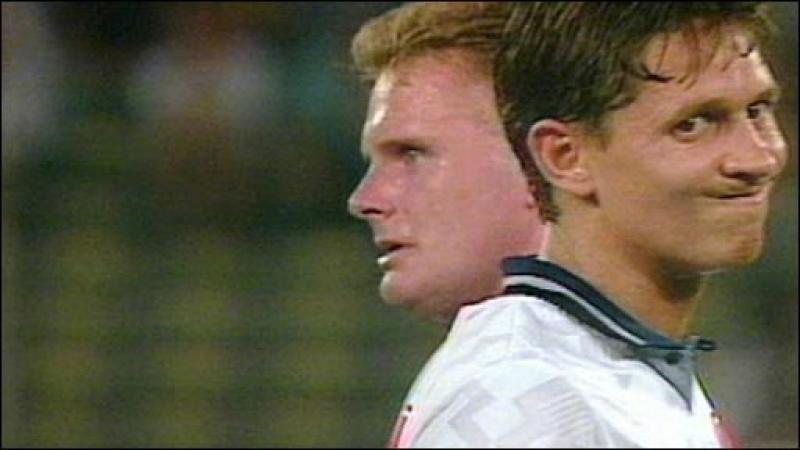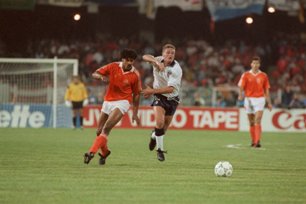One Night in Turin | reviews, news & interviews
One Night in Turin
One Night in Turin
Gazza Agonistes: Italia 90 explained on film

Why make a documentary about Italia 90? It’s just another tournament that England didn’t win, isn't it? If the World Cup hosted by Italy in 1990 deserves exhumation, it’s for its trickle-down impact on football as we live and breathe it now. Hence the subtitle that won't make it onto the billboard outside cinemas: The Inside Story of a World Cup that Changed Our Footballing Nation Forever.
This is the film of the book of the tournament which has a lot to answer for. Gazza cried, Pavarotti opened his lungs, and football became irreversibly commoditised. Attending as a reporter for the freshly created Independent on Sunday, I still vividly recall, from the very first game in Milan, being in the press room at the San Siro. “This is a money town,” sneered one cynical old-school hack. “It’s not a football town.” He couldn't have guessed from exactly how great a height all that television money was about to drop.
The press dubbed hooliganism the English Disease (not to be confused, of course, with le vice anglais)
In All Played Out the author Pete Davies went to Sardinia with the England team, the England press pack and the England fans, embedded somewhere between the three of them. For different reasons they all had a World Cup to remember, and Davies’s kinetic, furious, lyrical, sarky and completely uncut style yielded a compelling blow-by-blow account. Published with commendable haste, it was a game-changer for football literature. The earthy flavours of Davies’s prose now supply the narrative for One Night in Turin. Read with relish by Gary Oldman, they weave together the strands of a narrative which has a distinctive arc.
News of the revolution had yet to filter through to some England fans. The press dubbed hooliganism the English Disease (not to be confused, of course, with le vice anglais). But this new dispensation was part of a wider sweep of English footballing history. All those deaths at Bradford, Heysel and Hillsborough in the 1980s obliged the sport to modernise its stadia and its attitudes to crowd control. However, that spirit of reinvention did slowly wend its way out onto the pitch, where the yeoman's traditional long ball - hoof and hope - was kicked into touch in favour of dynamic, thoughtful playing patterns typified by Manchester United and, to everyone's surprise, the England football team which flew back from Italy to a grand civic welcome in, er, Luton.
That no one expected much from a squad labelled “donkeys” – Shilts the keeper was 40 and Captain Marvel more or less lived on a stretcher – is well told in One Night in Turin. Nor was there much residual faith in Bobby Robson, who thanks to a certain Hand of God had little to show for eight years as manager. And just to make life harder, the press pack were sniffing around for scandal while Mrs Thatcher’s sports minister Colin Moynihan, a bantamweight former Oxbridge cox possibly given to Napoleonic little-man syndrome, had advised the Italian paramilitaries to be extremely firm with England’s miscreant supporters. In this they were more than happy to oblige, with maximum lack of discrimination between the feral stone-throwers and lowlife glass-chuckers on the one hand, and the decent pie-eating majority on the other: batter, gas and deport first, ask questions later.
 Meanwhile, out on the pitch, the opener against Ireland took its aesthetic cue from the uglier elements of the national fanbase. A botched malformity, it is hideous to revisit in footage and photographs. I remember the reaction of the Italia 90 hostess in my hotel in Palermo. She knew nothing about football but even she could tell it was brutto: ugly. “The ball was always in the air,” she said, baffled. National embarrassment beckoned. I flew to report on the second game in Sardinia, when Robson surprised everyone, including no doubt himself, by introducing a sweeper system with which none of his players was familiar. We duly thrashed Holland 0-0 (pictured above). England’s unlikely saviour in this and subsequent games was a short fat lad from Newcastle, fatally ill-disciplined, over-emotional and still wet behind the ears. But hey, such failings never stopped Maradona.
Meanwhile, out on the pitch, the opener against Ireland took its aesthetic cue from the uglier elements of the national fanbase. A botched malformity, it is hideous to revisit in footage and photographs. I remember the reaction of the Italia 90 hostess in my hotel in Palermo. She knew nothing about football but even she could tell it was brutto: ugly. “The ball was always in the air,” she said, baffled. National embarrassment beckoned. I flew to report on the second game in Sardinia, when Robson surprised everyone, including no doubt himself, by introducing a sweeper system with which none of his players was familiar. We duly thrashed Holland 0-0 (pictured above). England’s unlikely saviour in this and subsequent games was a short fat lad from Newcastle, fatally ill-disciplined, over-emotional and still wet behind the ears. But hey, such failings never stopped Maradona.
It’s impossible to banish hindsight from an experience of this film. Just as the once ridiculed Robson has since been more or less beatified, Gascoigne could not know that those few weeks in Italy would represent the peak of his life. When a German got him infamously yellow-carded and banned from a place in the final, and the cameras caught him welling up, his finest hour was already behind him. He was too distraught to take one of those penalties. "You've got your life ahead of you," Robson consoled him in the middle of the pitch - captions spell out the barely audible words. "This is your first." It was his last. You know the rest.
I saw England lose to West Germany in the company of old friends, retired teachers living in southern Tuscany. It was a long way from Turin in every sense. They had a relative staying, a priest, who commentated on the entire game despite knowing nothing about football, and caring less. So I sort of missed the drama of Gazza’s meltdown. It’s well retold here. As for the penalty, before the game Waddle had cut off his famous mullet, apparently unaided by some Teutonic Delilah. You still watch it hoping he'll score. Without giving anything away, he doesn’t.
Do you need to see One Night in Turin? Directed by James Erskine, it consists mainly of archive news clips and cheap reconstructions between well-edited clips from the games themselves. So not necessarily in the cinema, which is why it’s on nationwide release for one night only, and then on 31 May goes straight to DVD (while All Played Out has been reissued as One Night in Turin). And there's also no need to bother if you’re under 30. That's the thing about tales of sporting glory from before your time. Just as it's hard to get too enthused about 1966 and all that if (like me) you were one, Italia 90 will mean little to football's youth demographic. Other people's nostalgia is like other people's dreams: thanks for sharing, but no thanks.
Kenneth Clarke on Moynihan, by the way: “He’s going to go very much further in politics.” The little chap’s not been heard of since. Meanwhile I’m still waiting for football to eat itself.
- Jasper Rees is the author of Wenger (Short Books)
Share this article
The future of Arts Journalism
You can stop theartsdesk.com closing!
We urgently need financing to survive. Our fundraising drive has thus far raised £49,000 but we need to reach £100,000 or we will be forced to close. Please contribute here: https://gofund.me/c3f6033d
And if you can forward this information to anyone who might assist, we’d be grateful.

Subscribe to theartsdesk.com
Thank you for continuing to read our work on theartsdesk.com. For unlimited access to every article in its entirety, including our archive of more than 15,000 pieces, we're asking for £5 per month or £40 per year. We feel it's a very good deal, and hope you do too.
To take a subscription now simply click here.
And if you're looking for that extra gift for a friend or family member, why not treat them to a theartsdesk.com gift subscription?
more Film
 London Film Festival - from paranoia in Brazil and Iran, to light relief in New York and Tuscany
'Jay Kelly' disappoints, 'It Was Just an Accident' doesn't
London Film Festival - from paranoia in Brazil and Iran, to light relief in New York and Tuscany
'Jay Kelly' disappoints, 'It Was Just an Accident' doesn't
 Iron Ladies review - working-class heroines of the Miners' Strike
Documentary salutes the staunch women who fought Thatcher's pit closures
Iron Ladies review - working-class heroines of the Miners' Strike
Documentary salutes the staunch women who fought Thatcher's pit closures
 Blu-ray: The Man in the White Suit
Ealing Studios' prescient black comedy, as sharp as ever
Blu-ray: The Man in the White Suit
Ealing Studios' prescient black comedy, as sharp as ever
 The Woman in Cabin 10 review - Scandi noir meets Agatha Christie on a superyacht
Reason goes overboard on a seagoing mystery thriller
The Woman in Cabin 10 review - Scandi noir meets Agatha Christie on a superyacht
Reason goes overboard on a seagoing mystery thriller
 London Film Festival 2025 - crime, punishment, pop stars and shrinks
Daniel Craig investigates, Jodie Foster speaks French and Colin Farrell has a gambling habit
London Film Festival 2025 - crime, punishment, pop stars and shrinks
Daniel Craig investigates, Jodie Foster speaks French and Colin Farrell has a gambling habit
 I Swear review - taking stock of Tourette's
A sharp and moving tale of cuss-words and tics
I Swear review - taking stock of Tourette's
A sharp and moving tale of cuss-words and tics
 A House of Dynamite review - the final countdown
Kathryn Bigelow's cautionary tale sets the nuclear clock ticking again
A House of Dynamite review - the final countdown
Kathryn Bigelow's cautionary tale sets the nuclear clock ticking again
 theartsdesk Q&A: Idris Elba on playing a US President faced with a missile crisis in 'A House of Dynamite'
The star talks about Presidential decision-making when millions of lives are imperilled
theartsdesk Q&A: Idris Elba on playing a US President faced with a missile crisis in 'A House of Dynamite'
The star talks about Presidential decision-making when millions of lives are imperilled
 Urchin review - superb homeless drama
Frank Dillane gives a star-making turn in Harris Dickinson’s impressive directorial debut
Urchin review - superb homeless drama
Frank Dillane gives a star-making turn in Harris Dickinson’s impressive directorial debut
 Mr Blake at Your Service review - John Malkovich in unlikely role as an English butler
Weird comedy directed by novelist Gilles Legardinier
Mr Blake at Your Service review - John Malkovich in unlikely role as an English butler
Weird comedy directed by novelist Gilles Legardinier
 Don't Let's Go to the Dogs Tonight review - vivid adaptation of a memoir about a Rhodesian childhood
Embeth Davidtz delivers an impressive directing debut and an exceptional child star
Don't Let's Go to the Dogs Tonight review - vivid adaptation of a memoir about a Rhodesian childhood
Embeth Davidtz delivers an impressive directing debut and an exceptional child star

Add comment